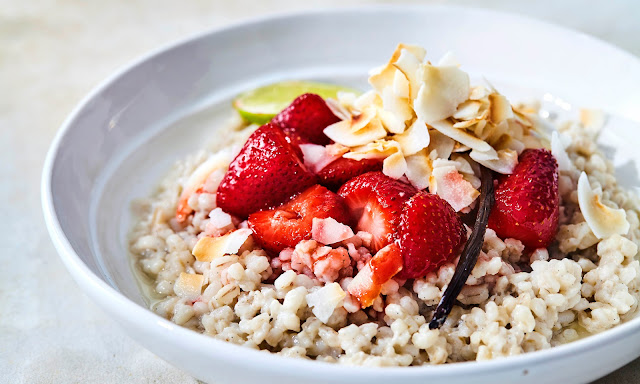- Get link
- X
- Other Apps
- Get link
- X
- Other Apps
Introduction:
Barley (Hordeum vulgare), an ancient grain with a rich history, has played a vital role in human civilization for thousands of years. As one of the first cultivated grains, barley has been a staple crop in various cultures across the globe. In this article, we will delve into the intriguing story of barley, its nutritional value, and the modern benefits it offers as a versatile and nutrient-dense cereal grain.
Barley's Historical Significance:
Barley has a remarkable heritage dating back thousands of years. Archaeological evidence suggests that barley was cultivated as early as 10,000 years ago in Eurasia, making it one of the first grains to be domesticated. It quickly spread across different regions, becoming a vital food source for ancient civilizations, including the Egyptians, Greeks, and Romans. Barley's resilience and adaptability to diverse climates played a significant role in its widespread cultivation.
Nutritional Value of Barley:
Barley is not only a versatile and delicious grain but also a nutrient powerhouse. Here are some key nutritional highlights of barley:
Fiber: Barley is an excellent source of dietary fiber, providing both soluble and insoluble fiber. This fiber content supports digestive health, aids in weight management, and helps regulate blood sugar levels.
Vitamins and Minerals: Barley is rich in various vitamins and minerals, including niacin (vitamin B3), thiamine (vitamin B1), magnesium, phosphorus, and selenium. These nutrients play essential roles in energy metabolism, nerve function, bone health, and antioxidant defense.
Protein: Barley contains a notable amount of protein, making it a valuable plant-based protein source for individuals following vegetarian or vegan diets. It also provides essential amino acids necessary for the body's growth, repair, and overall functioning.
Health Benefits of Barley:
Heart Health: The soluble fiber beta-glucan found in barley has been associated with numerous cardiovascular benefits. It helps reduce cholesterol levels, lowers blood pressure, and improves overall heart health. Regular consumption of barley may contribute to a reduced risk of heart disease.
Blood Sugar Control: Barley's high fiber content and unique blend of carbohydrates contribute to its low glycemic index (GI). Foods with a low GI help regulate blood sugar levels and can be beneficial for individuals with diabetes or those aiming to manage their blood sugar levels.
Weight Management: The fiber content in barley promotes a feeling of fullness, reducing overall calorie intake and aiding in weight management. Additionally, the slow digestion of barley's complex carbohydrates provides sustained energy, helping control cravings and snacking.
Gut Health: The fiber in barley acts as a prebiotic, nourishing beneficial bacteria in the gut. This promotes a healthy gut microbiome, enhances digestion, and supports immune function.
Incorporating Barley into Your Diet:
Here are a few ideas for including barley in your daily diet:
Soups and Stews: Barley's hearty texture and nutty flavor make it a perfect addition to soups, stews, and chili recipes. It adds a delightful chewiness and enhances the overall nutritional value of the dish.
Salads: Cooked and chilled barley can be used as a base for wholesome salads. Combine it with fresh vegetables, herbs, and a flavorful dressing for a satisfying and nutritious meal.
Side Dish: Replace traditional rice or pasta with cooked barley as a delicious and nutritious side dish. It pairs well with a variety of main courses, adding a delightful twist to your meals.
Conclusion:
Barley, one of the oldest cultivated grains in human history, continues to be a valuable and nutritious ingredient in modern times. Its rich nutritional profile, versatility, and numerous health benefits make it a fantastic addition to a well-balanced diet. Whether you're aiming to support heart health, regulate blood sugar levels, manage weight, or enhance gut health, incorporating barley into your meals can be a delicious and rewarding choice.
Embrace the legacy of this ancient grain and discover the many ways barley can contribute to your overall well-being.
References:
Harlan, J. R. (1992). Crops and man. Madison: American Society of Agronomy, Inc.
Hosseini, A., et al. (2016). Health benefits of barley. Journal of Traditional and Complementary Medicine, 7(4), 568-585.
Hu, X., et al. (2018). Barley β-glucan improves metabolic condition via short-chain fatty acids produced by gut microbial fermentation in high-fat diet fed mice. ACS Omega, 3(3), 2895-2900.
La Vecchia, C., & Negri, E. (1999). Barley and other fibers in the prevention of heart disease. Nutrition, Metabolism, and Cardiovascular Diseases, 9(6), 291-297.
US Department of Agriculture, Agricultural Research Service. (2020). Barley, pearled, cooked [Data set]. Retrieved from https://fdc.nal.usda.gov/fdc-app.html#/food-details/168450/nutrients

Comments
Post a Comment